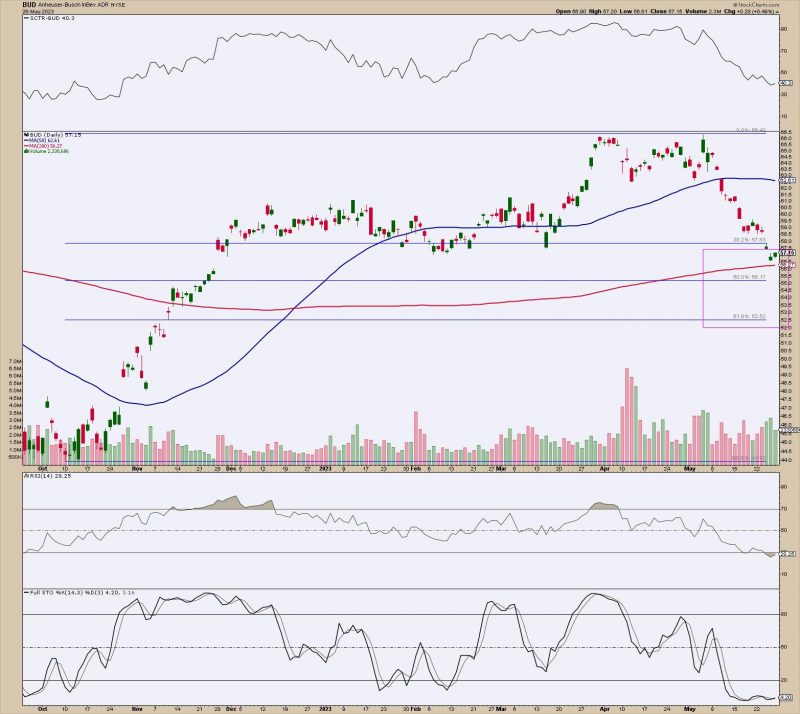BUD’s stock price has fallen hard, but it may be at a critical buy point. Is the king of beers (or rather, its parent company) a good buy, or is it something to avoid for now? Let’s take a closer look.
What Happened to BUD?
In April of 2023, the Bud Light brand became the center of an online firestorm, particularly on social media, after launching a promotional campaign with a controversial influencer. Within a few months, the reigning king of beers got dethroned, so to speak (at least in the States).
Within those two months, the share price of Bud Light’s parent stock, AB InBev (BUD), plummeted nearly 15%. The word on Wall Street was that the stock price might take a deeper dive yet. Technically, the damage was pretty evident.
But here’s the thing: What if all this hysteria is just an overblown reaction to a marketing ad?
Was the ad enough to dismiss Anheuser-Busch InBev’s diversified beer portfolio, global leadership, dominant market share, and overall potential as a business? If not, does the stock’s decline present a buying opportunity?
A Technical Look at BUD’s Current Scenario
CHART 1: DAILY CHART OF BUD STOCK. The stock price could be close to a critical support level.Chart source: StockCharts.com (click on chart for live version). For illustrative purposes only.
BUD’s buckling in April finally gave way to a plunge in May, toppling the beer king nearly 15% from a high of $66.32 to a low of $56.63. The Relative Strength Index (RSI) and Stochastic Oscillator indicate that the stock’s price has entered oversold territory. Not surprisingly, BUD’s StockCharts Technical Rank (SCTR) also dropped from 96 in April to 39.
Still, BUD’s momentum saw a dramatic shift toward the end of last year, enough to bring the 50-day simple moving average (SMA) well over the 200-day (a Golden Cross event) in a fairly strong, rapid, and definitive gesture.
But if you’re bullish on BUD, here are a few actionable points to consider:
BUD may have declined significantly over the past month, but it’s about to hit its 200-day SMA, which might serve as a critical support level.Right below the 200-day SMA is the range between the 50% and 61.8% Fibonacci retracement levels—both of which serve as ideal entry points for traders looking to go long.
In short, there are technicals confirming this dramatic negative shift in market sentiment, yet you can also see that BUD is approaching a few actionable levels. So, what now?
The Difference is Drinkability (Bud Light’s 2008 Slogan)
In other words, is BUD’s entire portfolio of beers still “globally” drinkable? Here are a couple of things to ponder:
Anheuser-Busch InBev (BUD) is the largest beer company in the world.It controls a third of the world’s market share in beer products.BUD’s portfolio has a list of more than 100 brands.The Bud Light Rebellion is mainly an American response.
Think about BUD, with its huge variety of drinks and global presence. Now, imagine if Bud Light sales were cut by half. How much do you think that would impact their worldwide sales? Probably not much. So, the real question is, how popular are all their different drinks worldwide?
How Might You Trade BUD?
This depends on how risk-tolerant you might be with regard to an early entry. Opening a fraction of a position at the 200-day SMA might make for a smart early entry, yet you can expect the price, should it continue sinking, to penetrate or bounce anywhere within the 61.8% to 50% Fib retracement (around $52 to $55). Waiting for a lagging indicator, such as the Moving Average Convergence/Divergence (MACD) line crossing the signal line, or waiting for the RSI or Stochastic Oscillator to turn up from their respective oversold levels, might be a good way to confirm the trend reversal, but they may also get you in a little later.
Taking an early position is risky, and it relies more on faith in fundamentals than any technical assurances. Yet, technically, the price action is calling attention to its current (potentially actionable) position.
Final Thoughts
Bud Light’s controversial promo resulted in a lot of trouble for its parent stock. Still, despite the backlash, is it enough to hurt BUD’s entire portfolio of 100 global brands and a third of the world’s beer market share? If you think so, then avoid BUD. If you don’t think it can topple the leader, then BUD might present a great buying opportunity. Consider adding it to one of your ChartLists.

